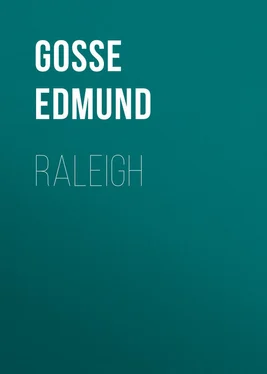Edmund Gosse - Raleigh
Здесь есть возможность читать онлайн «Edmund Gosse - Raleigh» — ознакомительный отрывок электронной книги совершенно бесплатно, а после прочтения отрывка купить полную версию. В некоторых случаях можно слушать аудио, скачать через торрент в формате fb2 и присутствует краткое содержание. Жанр: foreign_antique, foreign_prose, на английском языке. Описание произведения, (предисловие) а так же отзывы посетителей доступны на портале библиотеки ЛибКат.
- Название:Raleigh
- Автор:
- Жанр:
- Год:неизвестен
- ISBN:нет данных
- Рейтинг книги:3 / 5. Голосов: 1
-
Избранное:Добавить в избранное
- Отзывы:
-
Ваша оценка:
- 60
- 1
- 2
- 3
- 4
- 5
Raleigh: краткое содержание, описание и аннотация
Предлагаем к чтению аннотацию, описание, краткое содержание или предисловие (зависит от того, что написал сам автор книги «Raleigh»). Если вы не нашли необходимую информацию о книге — напишите в комментариях, мы постараемся отыскать её.
Raleigh — читать онлайн ознакомительный отрывок
Ниже представлен текст книги, разбитый по страницам. Система сохранения места последней прочитанной страницы, позволяет с удобством читать онлайн бесплатно книгу «Raleigh», без необходимости каждый раз заново искать на чём Вы остановились. Поставьте закладку, и сможете в любой момент перейти на страницу, на которой закончили чтение.
Интервал:
Закладка:
Raleigh, in all probability, took no part in the marchings and skirmishings of the English armies until the summer. His 'reckoning,' or duty-pay, as a captain in the field, begins on July 13, 1580, and perhaps, until that date, his services consisted in defending Cork under Sentleger. In August he was joined with the latter, who was now Provost-marshal of Munster, in a commission to try Sir James, the younger brother of the Earl of Desmond, who had been captured by the Sheriff of Cork. No mercy could be expected by so prominent a Geraldine; he was hanged, drawn and quartered, and the fragments of his body were hung in chains over the gates of Cork. Meanwhile, on August 12, Lord Grey de Wilton arrived in Dublin to relieve Pelham of sovereign command in Ireland. Grey, though he learned to dislike Raleigh, was probably more cognisant of his powers than Pelham, who may never have heard of him. Grey had been the patron of the poet Gascoigne, and one of the most prominent men in the group with whom we have already seen that Raleigh was identified in his early youth.
From the moment of Grey's arrival in Ireland, the name of Raleigh ceased to be obscure. Sir William Pelham retired on September 7, and Lord Grey, who had brought the newly famous poet, Edmund Spenser, with him as his secretary, marched into Munster. With his exploits we have nothing to do, save to notice that it must have been in the camp at Rakele, if not on the battle-field of Glenmalure, that Raleigh began his momentous friendship with Spenser, whose Shepherd's Calender had inaugurated a new epoch in English poetry just a month before Raleigh's departure for Ireland. It is scarcely too fanciful to believe that this tiny anonymous volume of delicious song may have lightened the weariness of that winter voyage of 1580, which was to prove so momentous in the career of 'the Shepherd of the Ocean.' Lodovick Bryskett, Fulke Greville, Barnabee Googe, and Geoffrey Fenton were minor songsters of the copious Elizabethan age who were now in Munster as agents or soldiers, and we may suppose that the tedious guerilla warfare, in the woods had its hours of literary recreation for Raleigh.
The fortress on the peninsula of Dingle was now occupied by a fresh body of Catholic invaders, mainly Italians, and Smerwick Bay again attracted general interest. Grey, as Deputy, and Ormond, as governor of Munster, united their forces and marched towards this extremity of Kerry; Raleigh, with his infantry, joined them at Rakele; and we may take September 30, 1580, which is the date when his first 'reckoning' closes, as that on which he took some fresh kind of service under Lord Grey. Hooker, who was an eye-witness, supplies us with some very interesting glimpses of Raleigh in his Supply of the Irish Chronicles , a supplement to Holinshed. We learn from him that when Lord Grey broke into the camp at Rakele, Raleigh stayed behind, having observed that the kerns had the habit of swooping down upon any deserted encampment to rob and murder the camp followers. This expectation was fulfilled; the hungry Irish poured into Rakele as soon as the Deputy's back was turned. Raleigh had the satisfaction of capturing a large body of these poor creatures. One of them carried a great bundle of withies, and Raleigh asked him what they were for. 'To have hung up the English churls with,' was the bold reply. 'Well,' said Raleigh, 'but now they shall serve for an Irish kern,' and commanded him 'to be immediately tucked up in one of his own neck-bands.' The rest were served in a similar way, and then the young Englishman rode on after the army.
Towards the end of October they came in sight of Smerwick Bay, and of the fort on the sandy isthmus in which the Italians and Spaniards were lying in the hope of slipping back to Spain. The Legate had no sanguine aspirations left; every roof that could harbour the Geraldines had been destroyed in the English forays; Desmond was hiding, like a wild beast, in the Wood. By all the principles of modern warfare, the time had come for mercy and conciliation, and one man in Ireland, Ormond, thought as much. But Lord Grey was a soldier of the old disposition, an implacable enemy to Popery, what we now call a 'Puritan' of the most fierce and frigid type. There is no evidence to show that the gentle Englishmen who accompanied him, some of the best and loveliest spirits of the age, shrank from sharing his fanaticism. There was massacre to be gone through, but neither Edmund Spenser, nor Fulke Greville, nor Walter Raleigh dreamed of withdrawing his sanction. The story has been told and retold. For simple horror it is surpassed, in the Irish history of the time, only by the earlier exploit which depopulated the island of Rathlin. In the perfectly legitimate opening of the siege of Fort del Ore, Raleigh held a very prominent commission, and we see that his talents were rapidly being recognised, from the fact that for the first three days he was entrusted with the principal command. It would appear that on the fourth day, when the Italians waved their white flag and screamed 'Misericordia! misericordia!' it was not Raleigh, but Zouch, who was commanding in the trenches. The parley the Catholics demanded was refused, and they were told they need not hope for mercy. Next day, which was November 9, 1580, the fort yielded helplessly. Raleigh and Mackworth received Grey's orders to enter and 'fall straight to execution.'
It was thought proper to give Catholic Europe a warning not to meddle with Catholic Ireland. In the words of the official report immediately sent home to Walsingham, as soon as the fort was yielded, 'all the Irish men and women were hanged, and 600 and upwards of Italians, Spaniards, Biscayans and others put to the sword. The Colonel, Captain, Secretary, Campmaster, and others of the best sort, saved to the number of 20 persons.' Of these last, two had their arms and legs broken before being hanged on a gallows on the wall of the fort. The bodies of the six hundred were stripped and laid out on the sands – 'as gallant goodly personages,' Lord Grey reported, 'as ever were beheld.' The Deputy took all the responsibility and expected no blame; he received none. In reply to his report, Elizabeth assured him a month later that 'this late enterprise had been performed by him greatly to her liking.' It is useless to expatiate on a code of morals that seems to us positively Japanese. To Lord Grey and the rest the rebellious kerns and their Southern allies were enemies of God and the Queen, beyond the scope of mercy in this world or the next, and no more to be spared or paltered with than malignant vermin. In his inexperience, Raleigh, to be soon ripened by knowledge of life and man, agreed with this view, but, happily for Ireland and England too, there were others who declined to sink, as Mr. Froude says, 'to the level of the Catholic continental tyrannies.' At Ormond's instigation the Queen sent over in April 1581 a general pardon.
Severe as Lord Grey was, he seemed too lenient to Raleigh. In January 1581, the young captain left Cork and made the perilous journey to Dublin to expostulate with the Deputy, and to urge him to treat with greater stringency various Munster chieftains who were blowing the embers of the rebellion into fresh flame. Among these malcontents the worst was a certain David Barry, son of Lord Barry, himself a prisoner in Dublin Castle. David Barry had placed the family stronghold, Barry Court, at the disposal of the Geraldines. Raleigh obtained permission to seize and hold this property, and returned from Dublin to carry out his duty. On his way back, as he was approaching Barry's country, with his men straggling behind him, the Seneschal of Imokelly, the strongest and craftiest of the remaining Geraldines, laid an ambush to seize him at the ford of Corabby. Raleigh not only escaped himself, but returned in the face of a force which was to his as twenty to one, in order to rescue a comrade whose horse had thrown him in the river. With a quarter-staff in one hand and a pistol in the other, he held the Seneschal and his kerns at bay, and brought his little body of troops through the ambush without the loss of one man. In the dreary monotony of the war, this brilliant act of courage, of which Raleigh himself in a letter gives a very modest account, touched the popular heart, and did as much as anything to make him famous.
Читать дальшеИнтервал:
Закладка:
Похожие книги на «Raleigh»
Представляем Вашему вниманию похожие книги на «Raleigh» списком для выбора. Мы отобрали схожую по названию и смыслу литературу в надежде предоставить читателям больше вариантов отыскать новые, интересные, ещё непрочитанные произведения.
Обсуждение, отзывы о книге «Raleigh» и просто собственные мнения читателей. Оставьте ваши комментарии, напишите, что Вы думаете о произведении, его смысле или главных героях. Укажите что конкретно понравилось, а что нет, и почему Вы так считаете.












